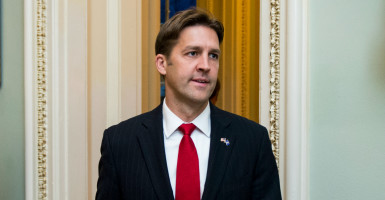Sen. Ben Sasse spent much of his freshman year without taking the podium. In a studied decision to use his previous reticence as leverage, the Nebraska Republican devoted his first speech on the Senate floor Tuesday to sounding the alarm on the rapid expansion of an “administrative state” comprised of unelected federal bureaucrats.
“The growth of the administrative state, the fourth branch of government, is increasingly hollowing out the Senate and the entire Article I branch, the legislature,” Sasse said. “Oddly, many in the Congress have been complicit in this hollowing out of our own powers.”
This unofficial fourth branch of government, he explained, emerged over the past century as legislators from both parties gradually relegated lawmaking authorities to the executive branch of the president to avoid taking on tough issues. (See the speech here.)
David Azerrad, director of The Heritage Foundation’s Simon Center for Principles and Politics, said this shift has placed nearly unlimited power in the hands of unelected bureaucrats to make policy, creating a “deeply entrenched” administrative state that exists largely beyond the constraints of the Constitution.
“Because this administrative state is to a considerable degree insulated from [the president’s] political control, and that’s by design, the next president will need to establish his authority over the bureaucracy, parts of which are comprised of independent regulatory agencies that are not formally housed in the executive branch of government,” Azerrad said Wednesday during a Heritage event on the subject.
This power shift, he said, created an “urgent problem” that needs to be addressed to restore the separation of powers.
First, Azerrad said, the “unusual excesses” under President Barack Obama have exacerbated the problem, in particular his “executive unilateralism” on issues ranging from health care to immigration to environmental law.
Passage by Congress of “mammoth” laws such as the Affordable Care Act and the Dodd-Frank financial reforms, he said, delegated immense powers to agencies to create costly regulations.
Finally, he said, the Supreme Court’s 2013 decision in City of Arlington v. FCC extended the ability of agencies, rather than Congress, to interpret their own statutory requirements.
Christopher DeMuth, a distinguished fellow at the Hudson Institute, said the candidate who wins the White House in 2016 should take bold steps right after taking office to show bureaucracies that he or she is willing to scale back bureaucratic power.
Specifically, he said the next president should approve the Keystone XL pipeline, undo the “dangers” of Dodd-Frank to the extent that can be done, and immediately take steps to remove the “highly perverse imposition” of federal regulation over the Internet.
But, DeMuth said, such a “radical change” will take time and demands strong presidential leadership.
“It’s going to require, to get out of the morass we’re in, an individual in the Oval Office who has a larger vision of things,” he said, “and can understand the interest of the good health of the constitutional order as going beyond his exercise of his prerogatives while he’s there.”





























